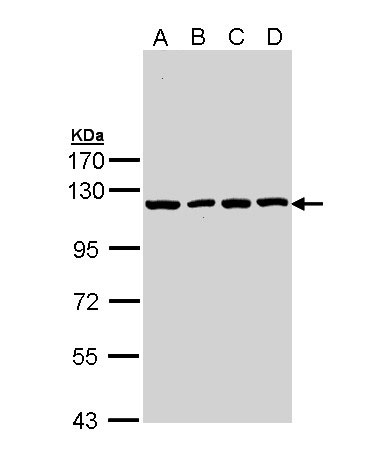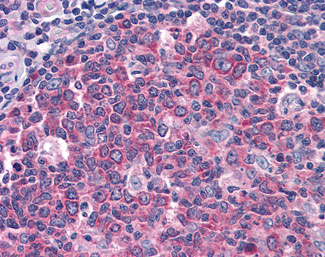IDE Antibody
Rabbit Polyclonal Antibody
- SPECIFICATION
- CITATIONS
- PROTOCOLS
- BACKGROUND

Application
| WB, IHC-P |
|---|---|
| Primary Accession | P14735 |
| Reactivity | Human |
| Host | Rabbit |
| Clonality | Polyclonal |
| Calculated MW | 118kDa |
| Dilution | IHC-P (10 µg/ml), WB (1:5000-1:20000), |
| Gene ID | 3416 |
|---|---|
| Other Names | Insulin-degrading enzyme, 3.4.24.56, Abeta-degrading protease, Insulin protease, Insulinase, Insulysin, IDE |
| Target/Specificity | Human insulin degrading enzyme. Predicted cross-reactivity based on amino acid sequence homology: mouse (94%), rat (95%), bovine (98%), zebrafish (90%). |
| Reconstitution & Storage | Aliquot and store at -20°C. Minimize freezing and thawing. |
| Precautions | IDE Antibody is for research use only and not for use in diagnostic or therapeutic procedures. |
| Name | IDE {ECO:0000303|PubMed:20364150, ECO:0000312|HGNC:HGNC:5381} |
|---|---|
| Function | Plays a role in the cellular breakdown of insulin, APP peptides, IAPP peptides, natriuretic peptides, glucagon, bradykinin, kallidin, and other peptides, and thereby plays a role in intercellular peptide signaling (PubMed:2293021, PubMed:10684867, PubMed:26968463, PubMed:17051221, PubMed:17613531, PubMed:18986166, PubMed:19321446, PubMed:23922390, PubMed:24847884, PubMed:26394692, PubMed:29596046, PubMed:21098034). Substrate binding induces important conformation changes, making it possible to bind and degrade larger substrates, such as insulin (PubMed:23922390, PubMed:26394692, PubMed:29596046). Contributes to the regulation of peptide hormone signaling cascades and regulation of blood glucose homeostasis via its role in the degradation of insulin, glucagon and IAPP (By similarity). Plays a role in the degradation and clearance of APP-derived amyloidogenic peptides that are secreted by neurons and microglia (PubMed:9830016, PubMed:26394692) (Probable). Degrades the natriuretic peptides ANP, BNP and CNP, inactivating their ability to raise intracellular cGMP (PubMed:21098034). Also degrades an aberrant frameshifted 40-residue form of NPPA (fsNPPA) which is associated with familial atrial fibrillation in heterozygous patients (PubMed:21098034). Involved in antigen processing. Produces both the N terminus and the C terminus of MAGEA3-derived antigenic peptide (EVDPIGHLY) that is presented to cytotoxic T lymphocytes by MHC class I. |
| Cellular Location | Cytoplasm, cytosol. Cell membrane {ECO:0000250|UniProtKB:P35559}. Secreted Note=Present at the cell surface of neuron cells. The membrane- associated isoform is approximately 5 kDa larger than the known cytosolic isoform |
| Tissue Location | Detected in brain and in cerebrospinal fluid (at protein level). |
| Volume | 50 µl |

Thousands of laboratories across the world have published research that depended on the performance of antibodies from Abcepta to advance their research. Check out links to articles that cite our products in major peer-reviewed journals, organized by research category.
info@abcepta.com, and receive a free "I Love Antibodies" mug.
Provided below are standard protocols that you may find useful for product applications.
Background
Plays a role in the cellular breakdown of insulin, IAPP, glucagon, bradykinin, kallidin and other peptides, and thereby plays a role in intercellular peptide signaling. Degrades amyloid formed by APP and IAPP. May play a role in the degradation and clearance of naturally secreted amyloid beta-protein by neurons and microglia.
References
Affholter J.A.,et al.Science 242:1415-1418(1988).
Affholter J.A.,et al.Mol. Endocrinol. 4:1125-1135(1990).
Ota T.,et al.Nat. Genet. 36:40-45(2004).
Deloukas P.,et al.Nature 429:375-381(2004).
Mural R.J.,et al.Submitted (SEP-2005) to the EMBL/GenBank/DDBJ databases.
If you have used an Abcepta product and would like to share how it has performed, please click on the "Submit Review" button and provide the requested information. Our staff will examine and post your review and contact you if needed.
If you have any additional inquiries please email technical services at tech@abcepta.com.













 Foundational characteristics of cancer include proliferation, angiogenesis, migration, evasion of apoptosis, and cellular immortality. Find key markers for these cellular processes and antibodies to detect them.
Foundational characteristics of cancer include proliferation, angiogenesis, migration, evasion of apoptosis, and cellular immortality. Find key markers for these cellular processes and antibodies to detect them. The SUMOplot™ Analysis Program predicts and scores sumoylation sites in your protein. SUMOylation is a post-translational modification involved in various cellular processes, such as nuclear-cytosolic transport, transcriptional regulation, apoptosis, protein stability, response to stress, and progression through the cell cycle.
The SUMOplot™ Analysis Program predicts and scores sumoylation sites in your protein. SUMOylation is a post-translational modification involved in various cellular processes, such as nuclear-cytosolic transport, transcriptional regulation, apoptosis, protein stability, response to stress, and progression through the cell cycle. The Autophagy Receptor Motif Plotter predicts and scores autophagy receptor binding sites in your protein. Identifying proteins connected to this pathway is critical to understanding the role of autophagy in physiological as well as pathological processes such as development, differentiation, neurodegenerative diseases, stress, infection, and cancer.
The Autophagy Receptor Motif Plotter predicts and scores autophagy receptor binding sites in your protein. Identifying proteins connected to this pathway is critical to understanding the role of autophagy in physiological as well as pathological processes such as development, differentiation, neurodegenerative diseases, stress, infection, and cancer.



